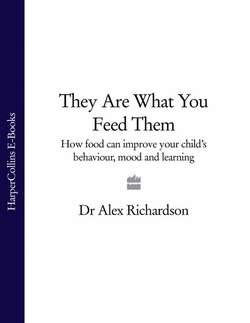Читать книгу They Are What You Feed Them: How Food Can Improve Your Child’s Behaviour, Mood and Learning - Dr Richardson Alex - Страница 37
Dyslexia
ОглавлениеIf your child is dyslexic, this can only be formally diagnosed after he’s spent many years struggling (and failing) to learn to read and write to the level expected for his age and general ability. Dyslexia involves more than just difficulties with written language, though. Early clues may include an unusual curiosity and an ‘intuitive’ kind of intelligence, with a tendency to think ‘holistically’, ‘laterally’ or ‘divergently’ rather than in a linear, sequential way. Dyslexic children are often particularly good at solving complex problems by seeing the bigger picture and using their creativity and logic to find original solutions. By contrast, despite their best efforts they experience failure and frustration in some tasks that other children find (literally) as simple as ABC.
A classic dyslexic area of weakness is ‘working memory’, especially for verbal, sequential information. Things can seem to go ‘in one ear and out the other’—particularly sequences of information with no intrinsic meaning, like telephone numbers, security numbers or the sequence of letters in the alphabet. (If your child is dyslexic, you’ll need to make sure that any important information of this kind is heavily ‘over-learned’, and/or that there are good back-up and reinforcing strategies.) Learning any verbal sequence—like the days of the week, or the months of the year—can be problematic, particularly more complex ones like reciting multiplication tables by rote. (This doesn’t necessarily mean that the mathematics isn’t understood – just that other ways of determining this will need to be found.) There may be persistent difficulties in telling left from right, and in learning to tell the time from a clock face. Difficulties with phonology (the sounds in words) are often regarded as a core feature of dyslexia, but this argument can be rather circular: We learn many of our advanced ‘phonological skills’ through learning to read—so any poor readers, including adults who are illiterate for social or cultural reasons, tend to find these tasks difficult.
When it comes to strengths, many dyslexic individuals show unusual talent in business, the visual arts and/or the sciences. A number of top financiers and outstanding business ‘visionaries’ are dyslexic4—and other professions with an over-representation of dyslexic adults include the arts, architecture, engineering, physical sciences and information technology. People with this profile are far less well suited to repetitive clerical or administrative jobs, but—provided they can avoid being judged too harshly on their spelling and punctuation—there’s no reason why dyslexic individuals can’t succeed in any occupation they may choose. One in 20 children is severely affected by dyslexia, and a further one in 20 has mild to moderate difficulties of the same kind—although the frequency in boys is slightly higher.
